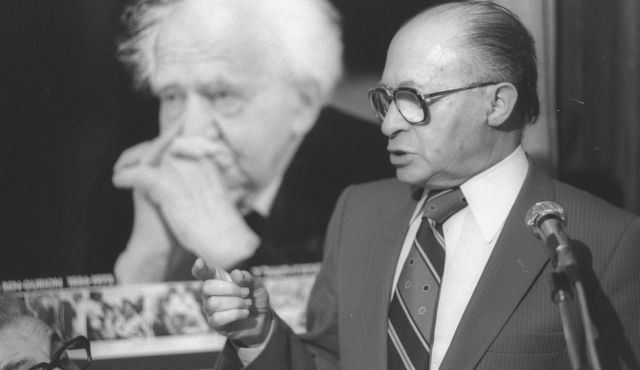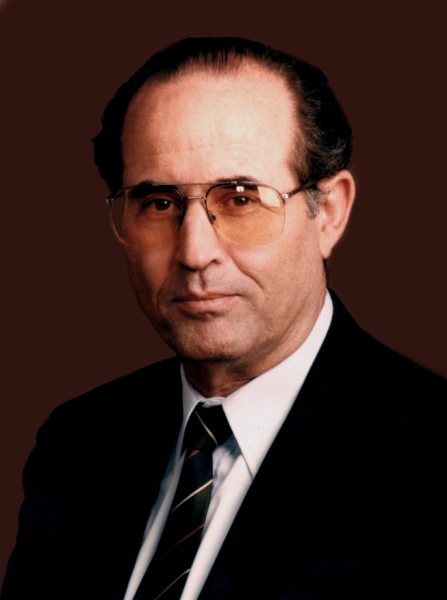The nation of Israel is galloping blindly toward Bar Kochba’s war on the Roman Empire. The result of that conflict was 2,000 years of exile.
By Shabtai Shavit

From the beginning of Zionism in the late 19th century, the Jewish nation in the Land of Israel has been growing stronger in terms of demography and territory, despite the ongoing conflict with the Palestinians. We have succeeded in doing so because we have acted with wisdom and stratagem rather than engaging in a foolish attempt to convince our foes that we were in the right.
Today, for the first time since I began forming my own opinions, I am truly concerned about the future of the Zionist project. I am concerned about the critical mass of the threats against us on the one hand, and the government’s blindness and political and strategic paralysis on the other. Although the State of Israel is dependent upon the United States, the relationship between the two countries has reached an unprecedented low point. Europe, our biggest market, has grown tired of us and is heading toward imposing sanctions on us. For China, Israel is an attractive high-tech project, and we are selling them our national assets for the sake of profit. Russia is gradually turning against us and supporting and assisting our enemies.
Anti-Semitism and hatred of Israel have reached dimensions unknown since before World War II. Our public diplomacy and public relations have failed dismally, while those of the Palestinians have garnered many important accomplishments in the world. University campuses in the West, particularly in the U.S., are hothouses for the future leadership of their countries. We are losing the fight for support for Israel in the academic world. An increasing number of Jewish students are turning away from Israel. The global BDS movement (boycott, divestment, sanctions) against Israel, which works for Israel’s delegitimization, has grown, and quite a few Jews are members.
In this age of asymmetrical warfare we are not using all our force, and this has a detrimental effect on our deterrent power. The debate over the price of Milky pudding snacks and its centrality in public discourse demonstrate an erosion of the solidarity that is a necessary condition for our continued existence here. Israelis’ rush to acquire a foreign passport, based as it is on the yearning for foreign citizenship, indicates that people’s feeling of security has begun to crack.
I am concerned that for the first time, I am seeing haughtiness and arrogance, together with more than a bit of the messianic thinking that rushes to turn the conflict into a holy war. If this has been, so far, a local political conflict that two small nations have been waging over a small and defined piece of territory, major forces in the religious Zionist movement are foolishly doing everything they can to turn it into the most horrific of wars, in which the entire Muslim world will stand against us.
I also see, to the same extent, detachment and lack of understanding of international processes and their significance for us. This right wing, in its blindness and stupidity, is pushing the nation of Israel into the dishonorable position of “the nation shall dwell alone and not be reckoned among the nations” (Numbers 23:9).
I am concerned because I see history repeating itself. The nation of Israel is galloping blindly in a time tunnel to the age of Bar Kochba and his war on the Roman Empire. The result of that conflict was several centuries of national existence in the Land of Israel followed by 2,000 years of exile.
I am concerned because as I understand matters, exile is truly frightening only to the state’s secular sector, whose world view is located on the political center and left. That is the sane and liberal sector that knows that for it, exile symbolizes the destruction of the Jewish people. The Haredi sector lives in Israel only for reasons of convenience. In terms of territory, Israel and Brooklyn are the same to them; they will continue living as Jews in exile, and wait patiently for the arrival of the Messiah.
The religious Zionist movement, by comparison, believes the Jews are “God’s chosen.” This movement, which sanctifies territory beyond any other value, is prepared to sacrifice everything, even at the price of failure and danger to the Third Commonwealth. If destruction should take place, they will explain it in terms of faith, saying that we failed because “We sinned against God.” Therefore, they will say, it is not the end of the world. We will go into exile, preserve our Judaism and wait patiently for the next opportunity.
I recall Menachem Begin, one of the fathers of the vision of Greater Israel. He fought all his life for the fulfillment of that dream. And then, when the gate opened for peace with Egypt, the greatest of our enemies, he gave up Sinai – Egyptian territory three times larger than Israel’s territory inside the Green Line – for the sake of peace. In other words, some values are more sacred than land. Peace, which is the life and soul of true democracy, is more important than land.
I am concerned that large segments of the nation of Israel have forgotten, or put aside, the original vision of Zionism: to establish a Jewish and democratic state for the Jewish people in the Land of Israel. No borders were defined in that vision, and the current defiant policy is working against it.
What can and ought to be done? We need to create an Archimedean lever that will stop the current deterioration and reverse today’s reality at once. I propose creating that lever by using the Arab League’s proposal from 2002, which was partly created by Saudi Arabia. The government must make a decision that the proposal will be the basis of talks with the moderate Arab states, led by Saudi Arabia and Egypt.
The government should do three things as preparation for this announcement:
1) It should define a future negotiating strategy for itself, together with its position on each of the topics included in the Arab League’s proposal.
2) It should open a secret channel of dialogue with the United States to examine the idea, and agree in advance concerning our red lines and about the input that the U.S. will be willing to invest in such a process.
3) It should open a secret American-Israeli channel of dialogue with Saudi Arabia in order to reach agreements with it in advance on the boundaries of the topics that will be raised in the talks and coordinate expectations. Once the secret processes are completed, Israel will announce publicly that it is willing to begin talks on the basis of the Arab League’s document.
I have no doubt that the United States and Saudi Arabia, each for its own reasons, will respond positively to the Israeli initiative, and the initiative will be the lever that leads to a dramatic change in the situation. With all the criticism I have for the Oslo process, it cannot be denied that for the first time in the conflict’s history, immediately after the Oslo Accords were signed, almost every Arab country started talking with us, opened its gates to us and began engaging in unprecedented cooperative ventures in economic and other fields.
Although I am not so naïve as to think that such a process will bring the longed-for peace, I am certain that this kind of process, long and fatiguing as it will be, could yield confidence-building measures at first and, later on, security agreements that both sides in the conflict will be willing to live with. The progress of the talks will, of course, be conditional upon calm in the security sphere, which both sides will be committed to maintaining. It may happen that as things progress, both sides will agree to look into mutual compromises that will promote the idea of coexisting alongside one another. If mutual trust should develop – and the chances of that happening under American and Saudi Arabian auspices are fairly high – it will be possible to begin talks for the conflict’s full resolution as well.
An initiative of this kind requires true and courageous leadership, which is hard to identify at the moment. But if the prime minister should internalize the severity of the mass of threats against us at this time, the folly of the current policy, the fact that this policy’s creators are significant elements in the religious Zionist movement and on the far right, and its devastating results – up to the destruction of the Zionist vision – then perhaps he will find the courage and determination to carry out the proposed action.
I wrote the above statements because I feel that I owe them to my parents, who devoted their lives to the fulfillment of Zionism; to my children, my grandchildren and to the nation of Israel, which I served for decades.
Haaretz, 24.11.14

